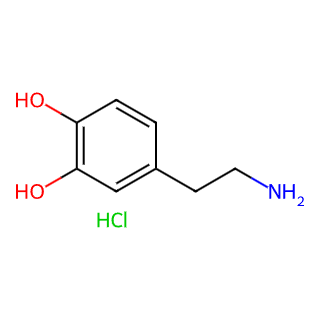- Synthetic anti-infective drugs
- Medications for the digestive system
- Antipyretic and analgesic drugs
- Medications for the blood system
- Medications for the respiratory system
- Anti-allergic drugs
- Medications for the urinary system
- Diagnostic medications
- Immunosuppressive and immunomodulatory drugs
- Vitamins and mineral supplements
- Antioxidants and medications for osteoporosis
- Antiparasitic drugs
- Ophthalmic medications
- Amino acids and their derivatives
- Dermatological medications
- Medications for the circulatory system
- Antitumor drugs
- Medications for the nervous system
- Hormonal and endocrine function-regulating drugs
- Antibiotics
- Others
CAS NO.: 62-31-7




Basic Information
Chinese Name: 盐酸多巴胺
English Name: Dopamine Hydrochloride
Alternative Names: 3-Hydroxytyramine; Catecholamine; 4-(2-Aminoethyl)-1,2-benzenediol Hydrochloride; Dopamine HCl, etc.
CAS Number: 62-31-7
EINECS Number: 200-527-8
Molecular Formula: C8H11NO2·HCl
Molecular Weight: 189.64
Physical Properties
Melting Point: 240-241°C (decomposes)
Density: 1.4 g/cm³
Boiling Point: 337.7 °C at 760 mmHg
Flash Point: 11°C
Solubility in Water: Readily soluble
Other Solubilities: Soluble in methanol and hot 95% ethanol, soluble in sodium hydroxide solution, insoluble in ether, chloroform, and benzene
Chemical Properties
Stability: Stable, but incompatible with strong oxidizing agents
Flammability: Flammable, decomposes to produce toxic oxides of nitrogen and chloride gas upon burning
Uses
Dopamine Hydrochloride is an essential biochemical reagent and a vasopressor medication.
Clinically, it is primarily used to treat various types of shock, especially those accompanied by decreased myocardial contractility and renal insufficiency.
Dopamine Hydrochloride stimulates cardiac β-receptors, increasing myocardial contractility and cardiac output. Simultaneously, it stimulates dopamine receptors and α-receptors, causing vasodilation in the kidney, mesenteric, coronary, and cerebral vessels, leading to increased blood flow and renal blood flow, which enhances glomerular filtration rate and promotes increased urine output and urinary sodium excretion.
Safety
Dopamine Hydrochloride is classified as an irritant and requires proper precautions during handling.
Its acute toxicity data indicates an LD50 of 2859 mg/kg in rats and 4361 mg/kg in mice.
Storage and Transportation
Dopamine Hydrochloride should be stored in a low-temperature, ventilated, and dry environment, away from direct sunlight and high temperatures.
During transportation, ensure that the packaging is intact to prevent leakage and moisture.

Tai Yau Street, San Po Kong, Kowloon, Hong Kong, China.



